Catalyzing the Call-to-Action through innovative models and big ideas
About the discussion group
In this discussion, we want to hear your thoughts on:
"What are the models and big ideas that can catalyze reimagined support for volunteers and approaches to volunteering in the context of accelerating progress to achieve the SDGs?"
(Add your responses by clicking on the tab 'Discussions")
What is the Call-to Action?
The A Call-to-Action on Volunteering in the Decade of Action outlines seven key areas that require urgent action. It is the main outcome of the Global Technical Meeting on Reimagining Volunteering for the 2030 Agenda that convened online from 13-16 July 2020, as part of The Plan of Action to Integrate Volunteering into the 2030 Agenda.
7 ACTION AREAS
- People of all backgrounds need opportunities to show leadership through volunteering across all the SDGs;
- All forms of volunteering, including informal volunteering, should be supported by organizations, policies and laws;
- People need to have equitable access to inclusive and safe volunteering;
- People’s and volunteers’ voices need to be listened to and acted upon by decision-makers;
- Innovative models and approaches should be piloted to support voluntary action;
- The impact of volunteering beyond delivering essential services should be measured;
- Volunteering must be integrated with other efforts to achieve the SDGs.
What ideas and examples are we looking for?
In responding to the question above, you could share examples of:
- Actions that open up the most beneficial volunteering opportunities to the most marginalized in societies, for example, leadership and engagement opportunities through volunteering for women in contexts where gender inequality is a major challenge;
- New forms of cooperation with informal or community volunteers, for example by including traditional or local knowledge and volunteer efforts in local policy development processes in support of achieving the SDGs;
- Platforms and partnerships that enable: i) researchers and policy actors from across sectors (e.g. private sector, academia), particularly from the global South to collaborate and share their findings on volunteering and innovative ideas with a global audience; and ii) experts and practitioners to volunteer their knowledge and capacities to help design solutions to sustainable development challenges identified most relevant by people across contexts;
- Initiatives and partnerships that enable: i) the voices of marginalized groups to be heard and acted upon, such as new civic spaces, people-led assemblies, and coalitions that have enabled least-heard groups to participate in problem/challenge identifications as well as the decisions that affect them; and ii) creation of opportunities based on new perspectives shaped by openly available volunteer-led data and insights
- Balancing the positives and negatives of volunteering in communities across different groups, genders, and types of volunteers, for example through the better division of tasks among women and men, or through psychosocial support for local volunteers in crises.
- Models that assess the impact of volunteering so that policy-makers can better understand the value of volunteering and the impact of different approaches to supporting volunteers and volunteering, such as measurement frameworks that capture the contributions of volunteering beyond GDP.
Why take part?
The evidence may be used in the 2021 Report of the Secretary-General on Volunteering, and as a resource for approaches to realize the Call to Action – to make volunteering a transformative force for the 2030 Agenda.

In reply to (No subject) by Boram Kim
When we embarked on a process to ‘reimagine volunteering’ culminating in the global meeting last July, it became very clear that we cannot continue with business as usual – and that we need new ideas, partnerships and approaches to fully maximise the value of volunteering for the SDGs.
We’re seeing some exciting innovations on this front, especially from the private sector – SAP, for instance, focused on widening partnerships and working more closely with communities, non-profits and social enterprises to support digital inclusion and bridge the digital divide among the haves and have nots. Many companies are also setting out to reimagine digital volunteering and taking on a more active role in setting up intelligent systems to expand volunteering opportunities for everyone, young and old, men and women, etc.
Do you have examples and out-of-the-box ideas you would like to share for next generation volunteering? Tell us!
In reply to (No subject) by Katrina Borromeo
In UAE, Emirates Foundation launched a national volunteering platform named Volunteers. ae in 2017, for youth to engage in community service. Volunteers also can register and choose volunteering activities through a mobile application called Dubai Volunteer which provides auto-notifications for volunteering opportunities. In Lebanon, the Alumni of the American University of Beirut has developed a website that provides a volunteer matching service. Besides, people use online volunteering, social media, and mobile applications to look for and engage in volunteering opportunities. For instance, volunteers register on the Matar Project App to provide audio-record or type the text for the visually impaired in the region. Similarly, Be My Eyes free mobile app connects volunteers in Arabs states to the blind and visually impaired. Volunteers provide their time and talents through these online platforms.
In reply to (No subject) by Juhee.Woo

In reply to (No subject) by Juhee.Woo
In reply to (No subject) by Boram Kim
(Reference 2: https://www.1365.go.kr/vols/1572247923954/partcptn/onlinePartCptn.do ) is operated by the Ministry of the Interior and Safety of South Korea.
In reply to (No subject) by Juhee.Woo

In reply to (No subject) by Juhee.Woo
In reply to (No subject) by Boram Kim
Dubai Volunteer is a good launch, but users' review is bad (https://play.google.com/store/apps/details?id=ae.gov.cda.voulunteer&hl=en_IE)
Matar Project App and Be My Eyes free mobile app: I attended volunteering exhibition at the University of Jordan last year and could know them there. These two apps show a high rating of 4.5/5.0 from global users. (References: https://matarproject.org/ https://play.google.com/store/apps/details?id=com.bemyeyes.bemyeyes&hl=en&gl=US)
I have no idea what made them successful, how they are promoted, and if there are people left behind without phone or access to the internet. What I can assume is that those apps and platforms could have been promoted at some volunteering events.

In reply to (No subject) by Katrina Borromeo

In reply to (No subject) by Boram Kim
“If only we could make volunteering so trendy and viral as some of the most successful online games, we could add valuable social capital into our communities.”
We are probably living in the right moment to make it happen.
Due to the global economic and social crises that will be deepened in the aftermath of the Pandemic, we should stablish international streams of solidarity going both ways from de global north to the global south. It could carry knowledge, services, goods and funds to reduce the negative impacts of COVID-19, which, in turn, will pose great threat to the progress of the SDGs.
The year 2020 has definitely catalyzed the digitalization of many aspects of our lives, including volunteering. Through online interactions we could develop something similar to a “supply chain of doing good”. Leveling resources, human capital and even volunteering culture across nations.
I am a firm believer in giving people a clear direction and breaking the path to an objective into goals. I have been working with different approaches on the gamification of volunteering programs with very satisfactory outcomes.
To take advantage of gamification, we could organize these chains of people and institutions around one SDG at a time, with measurable results.
I know it is complex and not easy to do, but I think that we finally have the capabilities, technologies AND the urgency to act.

In reply to (No subject) by Marcelo Nonohay
Also, would it be possible to share some highlights of the gamification of volunteering programme you mentioned. I really appreciate your encouragement to all of us saying we have capabilities, technologies and the urgency to act. Spot on!

In reply to (No subject) by Boram Kim
We´ve been using gamification with four main objectives:
1. Lowering entry barriers – One of the most common excuses for people not volunteering (in my country, at least) is that although they always wanted to get involved, they never knew how. When you invite someone the play, whatever game it is, everyone will remember all the playing the have done since they were Childs. So, gamification significantly lowers the entry barriers for volunteering, especially if they have never engaged as volunteers during their lives.
2. Teaching how to be a volunteer - As we mobilize many people who have never worked as volunteers, we use the gaming system to show them the way. So, they get points all along the volunteering process. Usually, they earn point starting from their engagement, knowledge leveling, finding the right nonprofits to work for, listening to the NGO to find their real needs, planning, executing and reporting their impact.
3. Going beyond the basic volunteer actions – People tend to think of the same volunteering actions, which usually are very hands-on and not very skill based. Not that the hands-on volunteering actions are not important, but many times we want volunteers to deliver much more value to communities. So, if we put up a system where we can emphasize, through the scoring logic, which actions are the priority, people will tend to do them.
4. Reducing the cost of volunteer management – When you gamify your project you delegate part of the management process to volunteers, therefore you reduce the ration of money invested in volunteer management X impact – that is making your volunteer action more effective.

In reply to (No subject) by Marcelo Nonohay

In reply to (No subject) by Boram Kim
On the ongoing discussion, I think to catalyze support for volunteers in achieving the SDGs, volunteers should be allowed to contribute their expertise however in a little way that may be because it is the many little efforts that will built the big cake.

In reply to (No subject) by Esther

In reply to (No subject) by Boram Kim
Please receive as a prelude my sincere greetings and thanks for belonging to this group of in order to provide avenues for reflection to facilitate the success of the SDGs on time.
We have noticed that the pace of poverty reduction has slowed. Between 2013 and 2015, poverty fell by 0.6 percentage point per year, while the average decline over the past 25 years was one point per year. In addition, the forecast for 2018 (8.6%) indicates that the rate of poverty reduction is even slower, at less than half a point per year between 2015 and 2018. It is more difficult to forecast at by 2030, but we can nevertheless study various scenarios to determine how the situation could evolve. For this, we analyze scenarios based on different growth levels to project a poverty reduction rate. According to this analysis, for the goal of ending extreme global poverty in the world by 2030 to be met, the income of the bottom 40% will need to increase by 8% or more each year. Based on current growth rates, the scenarios suggest an extreme poverty rate of over 5% in 2030.
Globally, Africa is the continent that concentrates more than half of the extreme poverty.
I take the case of a country in West Africa, the Republic of NIGER, that I have participated a lot in the study of socioeconomic and demographic indicators in 2015 (ENISED - 2016) to highlight whatever data of the characteristics of poverty.
It should be noted, however, that this data is a funeral, but the objective is to have an idea to read the situation.
In fact, from 1992 to 2015, the risk of dying from birth to the fifth birthday fell from 318.2 ‰ to 126 ‰, ie an annual average decrease of 4.1%. The decline in neonatal mortality has remained more timid than the forms of infant and child mortality. It is estimated at 2.3% on average each year. Actions in favor of the reduction of neonatal mortality could be initiated, in particular the deaths of the first two days after birth which are the most important (source ENISED 20156- INS Niger). So, we can see a significant advance but much remains. These characteristics are nearly the same in all countries of West Africa, a high rate of child mortality. Then, of the 164 countries for which the World Bank measures the evolution of poverty, more than half (84 countries) already recorded rates of less than 3% in 2015. This encouraging result is however one of the reasons for the slowdown observed today in the decline in the poverty rate.
The question remains whether the SDGs can be achieved by 2030?
Personally, I remain optimistic that they can indeed be achieved on time.
How to meet these SDG goals?
It is clear and imperative to turn to the valuation of volunteering. How to innovate and enhance the culture of professionalism for effective volunteering?
My suggestions:
1. Increase the rate of recruitment of volunteers.
2. Overcome the challenges of integrating volunteers into their mission and in their host country.
3. Train multidisciplinary volunteers in several possible languages in order to break down the language barrier and be present wherever and whenever the need arises.
4. The professionalization of volunteering, which will be both an opportunity and an additional challenge for voluntary engagement. It can be seen as an opportunity to raise the profile of the volunteer, especially when the latter has official status. But if the requirements are too high, it can also be a barrier for people wishing to join without specific skills.
5. Multiply and strengthen partnerships with States and increase the envelope of financial assistance in the support of education, health, sanitation, environment, gender, security, youth entrepreneurship, ... with mandate of volunteers to sit within the various line ministries (health, education, finance, hydraulics, environment, etc.) of the beneficiary country in order to ensure the execution and rationalization of the planned expenditures.
Regards,

In reply to (No subject) by mahamansiradji…
And thank you for proposing those five valuable points. Professionalization of volunteering has been much discussed in the sector, but your cautious explanation about access barrier is also very relevant. I think our future work to support volunteering is to emphasize much more on lowering access to volunteering and ensuring equitable opportunities to volunteer by all those who wish to.
On your second suggestion, how can we overcome such challenges? Who do we have to work with, for example, to realize this suggestion?

In reply to (No subject) by Boram Kim


In reply to (No subject) by Piera
Thank you for raising this important point on data. I agree that our work is to be much more informed by evidence to be able to make meaningful contributions to the SDGs. Having said that, I wonder whether a real gap lies in our ability to ask the right questions or formulate relevant hypotheses to be backed up by data and evidence. When we talk about the contributions of volunteering, what would be those critical questions that would require answers in our sector, especially as we have 10 years to achieve the SDGs? What do we need to prove for volunteering to be placed at the heart of the 2030 Agenda, for example?

In reply to (No subject) by Boram Kim

In reply to (No subject) by Vincent


In reply to (No subject) by Sarah Igobwa
My question back to you, Sarah, would be: how can we meaningfully engage those rural women in communities when achieving the SDGs? How would they see volunteering - what good or bad it does, for example? What are some of the critical aspects that we have to consider when engaging them?
projects and boost their experience – contributing to the SDG 8.

In reply to (No subject) by Juhee.Woo
On the private sector partnerships, how interesting that the partnerships entail supporting a specific SDG. We need more of these examples to diversify our evidence base, so keep those inspiring examples coming to our way, Juhee!

I'm Chris Millora from the Philippines and really glad that we are having this discussion!
What has struck me about the world of volunteering is that there are so many aims, approaches and assumptions to it - and, my research has made me realise that often this models are being influenced by how people and polices understand 'development'. For example, many people think development is economic growth - so there are volunteering approaches where the focus is in measuring the economic contribution of volunteering. The abundance of these models point to two things - there are models that are more dominant while other models are less dominant. For example, it is only very recently that we are recognising the significance of informal volunteering - eg helping out an neighbour buy groceries, volunteering for church service etc - because the 'dominant model' have always been that volunteering is done through organisations like Red Cross, Save the Children, etc. The second aspect is that these diversity of models should be seen as a resource rather than a challenge - how do these different models interact? Do they support or crowd out each other? For example, in the Philippines, the politics of local responses to COVID-19 have led to volunteers being arrested under malicious (see some of my observations here: https://twitter.com/chrismillora/status/1258344478148001792).
Having said this, I believe that a valuable approach to volunteering is that of 'community participation'. This means that volunteering is seen less as a formal service delivery tool to achieve development outcomes (eg SDGs) rather as a helping activity that people do everyday, part of communities' cultures and identities. I have written a bit about this here: https://people.uea.ac.uk/en/publications/tolerance-and-inclusion-volunteering-enabling-community-cohesion-and-embracing-diversity(84f28874-4a94-48a3-80d2-ab224f87da15).html where I argue that everyday acts of helping brings communities together, when face with a shared problem, people turn to each other for support. When seen this way, we begin to realise that people are already contributing to the SDGs in various ways and scales - the challenge is how to document them and for institutions like the UN - how to support them and recognise them. So if we want to accelerate the SDGs - I think we need to look at these forms of local organising seriously. We need to think about to what extent can these be supported without influencing their efforts and co-opting their agenda!
What are some of the concrete steps to do this? It's difficult - and would be great to talk more but here are some ideas:
- When we develop a programme or policy, perhaps we can begin with asking what knowledges, practices, capacities are already existing in the communities we work with (and then take it from there!) rather than coming in with pre-set ideas/agenda/solutions.
- Related to this, there are loads of planning and research tools that are founded on participatory ethos. It's easy for people to say, 'yes let's listen to the voices of the poor!' or 'we need to involve 'poor women' in decision making' but how to do this? The Institute for Development Studies in the UK has put together this useful website https://www.participatorymethods.org/ where you can see practical tools on participatory methods - from participatory mapping exercises to participatory bugetting! Really interesting and fun methods and they have been effective, based on my experience, in engaging with people with various literacies as well!
- Finally, I think we need to embed a learning component in our programming and policy-making. When we write a policy or develop a programme, it is not always perfect - but wouldn't it be great if we can embed in the process a sense of reflection and action - whereby we think about about what we learn and then try and change things (even just a little)? I noticed that people often think of policies as a static process. You think of a problem, you offer a solution. When one embeds the lens of learning, he/she considers, who defines the problem? How can we learn from each other in terms of developing solutions?
That's all for now and looking forward to engaging more! :)

In reply to (No subject) by chrismillora
I kept nodding my head as I was reading your comment and am still nodding :-) It's also great that you help articulate some of our like-minded thinking. I am not always good at articulating!
Agreeing to all what you said, as someone associated with the UN, your point on letting communities and people look after the issues they care about without trying to fit in to something others created resonates me. I can't speak on behalf of the entire UN, but here are my small efforts that I have been practicing in my speaking and writing engagements recently:
Sustainable development or SDGs --> challenges or issues people/communities face (what's important to them?)
Volunteering --> people coming together to take action and also feel a sense of belonging (including to identify and agree on a problem that affects them and their families and to design a solution that works in their situation, for example)
Policy or policy integration --> how do we channel our voices and to whom to be heard?
New ideas --> existing and yet not all of us might not be aware of.
As this conversation will help shape next generation models of volunteering, I very much look forward to our further exchanges, particularly on appreciating "less dominant" models and some of the exciting participatory methods to be able to apply in the process.
Lastly, on the static process of understanding policy formulation, this is one of the reasons why UNV is looking to partner with innovation actors to be able to map solutions, then test in a real life and then modify and/or scale based on the outcome. But this is the territory much to be uncovered and I anticipate some trials and errors until many of us feel comfortable to take that chance.

In reply to (No subject) by Boram Kim
Guterres has been calling for more participation, new forms of participation, so with the SDGs, we have really a tool or a platform to shift from high impact BIG V’s actions on the ground (that would always remain super relevant and the core essence of volunteering) to also a different form of engagement in terms of participation, therefore contributing to public policy. This will feed into increased levels of civic engagement.
I think it is what you were saying as well…or close to it.

We should then empower her by introducing to her the 17 SDGs. Let them know the importance of each SDG. Most of them if not all, do not know what SDGs are. Train them and give them an opportunity to suggest how they would like to participate in achieving each goal. Knowledge is very important here. Select a few women for example first from different areas then increase the number. Covid 19 may limit our efforts, but we could do it in different areas so that the whole community is covered.
Introduce them to the new technology as we go through the SDGs. They should be able to communicate effectively. Most of them have the old type of mobile phones. Very little knowledge on WhatsApp which is more effective. This would ease their training.
Not forgetting persons with disabilities(PWDs) should also be part of the training.
In order to make this successful, you should provide them with some allowances that will enable them to start up.

In reply to (No subject) by Sarah Igobwa



In reply to (No subject) by upendranadh


In reply to (No subject) by Hussain Hamzah

In reply to (No subject) by Marcelo Nonohay
Youth are often considered to enhance their skills to increase the prospect of employment in the future through volunteering. However, I do think youth can bring much more than that. For example, their spirit, their openness to connect with "strangers" to innovate and take action and their willingness to spread optimism, to name a few. Also they can empathize with other young people on the other side of the globe facing similar issues and connect. Such solidarity and ability to connect creatively are what we need more of nowadays?
And Marcelo, thank you for speaking highly of our UNV programme :-) It sounds like we have some talking to do with UNESCO (ha!) More seriously, I would like to get your insights on what the best way would be to cultivate such culture in schools and who we have to work with to. Also volunteering is much grounded in cultural norms in many countries, so I can think of the importance of exposure to different community or village groups and leaders for learning and practice. But this will vary much across country or community contexts.

In reply to (No subject) by Boram Kim
Thank you for this platform ,indeed so many thought and great ideas...so thinking on the line of narrowing down to hands on and skill based volunteerism which will enhance or create a greater impact on achieving better results. ...taking for example matching youths who need to learn skills such as carpentry, photography, art,catering, agricultural business etc with student or leacturers training /trained volunteers in the given fields willing to impart their knowledge and skills....giving them an opportunity to experience diverse cultural heritage in different countries. Having a platform that grants volunteers quality information on the volunteer opportunities across the board as well as exchange of experiences from the volunteers as well as the recipients enhances the capacity to come up with best practices tailor made for individual countries and communities....In short having a global volunteer platform where volunteers,organization's get to meet and learn what is working best for different communities....I think engaging in education volunteering is also a great idea and would go along way in promoting the hands on and skills program....for the volunteers ,they get an opportunity to engage in tourism and rich cultural experiences

In reply to (No subject) by Scholah

Lots of thank for approaching the world community for an integrated action to achieve the SDGs by time. In fact, all the 17 Goals and its 169 associated targets are interlinked, but our responses to achieve the goals are fragmented till now and we are nowhere near the path to success of 2030 Agenda by time. Thus the plan of action to integrate volunteering into the 2020 Agenda for sustainable developments is the first most essential step towards the success of SDGs in actual fact. Thanks again for this great endeavor for the betterment of all humanity worldwide.
Now our biggest challenge is to encourage all for an integrated action for the success of SDGs by time. How to unite all beyond the inherited system of thought divided by several political and religious strictures?
From last many years, just after the UN-SDGs was crystallized, I have tried to contribute the basic ideology to approach the global community for the proposed integrated action to make volunteering a transformative force for the 2030 Agenda through many platforms, but till now I haven’t got any positive response.
Now I believe, I am on the right platform from where I can get some affirmative responses and appreciation for my plan of action to integrate volunteering in to the 2030 Agenda, in a simple practical way and that would not need extra cost or efforts for its implementation.
Here I am representing my idea step by step, seeking your attention in this regard.
…………………………………………………………………………
UN-SDGs – Addressing the biggest global Challenges – With simple solution (SDG 4.7 & SDG 16.a) to save people and this planet
“There can be no sustainable development without peace (SDG 4.7 & SDG 16.a) and no peace without sustainable developments.”
Presently, United Nations Sustainable goals is an essential need of this contemporary world that we do need for the betterment of our future generation on this planet, but presence of racism, radicalization, political collisions and war are creating basis for worldwide humanitarian crisis that adversely impacts every aspects of our social and economical developmental efforts. It means we are only dedicated for “Peace through prosperity” ignoring the ideologies for “prosperity through peace”, so the achievements of scientific insight are resurrecting beyond the process of Nature, and the graces of humanity are descending to a dangerous abyss, making the implementation of SDGs patchy so far.
What is the solution in actual fact?
In fact, it is impossible for any individual organization or political, professional and scientific insights to overcome the perils that would destroy this planet more than our imagination. Thus we will have to look beyond the perception of this current human race divided by several political and religious strictures, to unite the global community making the SDGs a household word. Although it appears impossible, in actual fact it is possible through the “go-between” the basic potential of literature, following the core value of SDG 4.7, to crystallize the progress of SDGs through academic sources.
“Educating the mind, without educating the heart is no education at all.” -Aristotle
Now it is only the graces of literature that could educate the mind and heart together. There is no doubt that the greatest aspect of literature is that it enthralls our mind and spirit from childhood to the end of our lives. It is a major part of our intellectual heritage, as important as our scientific and professional insights; it influences our inherited system of thoughts and throws into relief our genetic nature. Always literature had been the treasure house of wisdom that guides human conscience towards final home whatever our faith directs us.
Presently conscience of our young generation between 10 to 24 ages is lethally vulnerable, being used in all form of violence and it is the biggest global challenge that needs a “unanimous conclusion” to accelerate the academic sources to educate our children to overcome the compartmentalized of technical and policy work by promoting integrated approaches to the interconnected economic and social challenges confronting the world. In fact, all the 17 goals and its 169 associated targets are interlinked, but the efforts to achieve the goals are fragmented, making the SDGs a tool for unjust political or unfair professional beneficence. Now immediately we will have to look straightforward to encourage the young generation for global unison and integrated actions by offering clear guidance to approach the SDGs in a practical and proper way.
More than that, the gap and difference between languages, culture and norms of the religious teachings are providing the safe ground for the business of racism and radicalization that exacerbate the basis of war and terrorism according to their own political stances and positions hindering the progress of SDGs. There is no doubt, till now we are only destroying the embodiment of terrorism, ignoring it brutal ideology invincible befor the world’s leadership and all the leading religious teachers struggling with the ensign of peace and cultural diversity. Presently in these circumstances the world’s money and gun power are not potential enough to combat the sources of racism and radicalization that conceal their sins behind religious narcissism. It means now it’s the time to represent the history of humankind on Earth within scientific insight to prove that the definitions of all the leading world religions are based on their contemporary needs, to help human being to evolve under Natural process on basis of peace and solidarity, not to rule over the people from other community or sect and the religious sanctity is not a subject to obtain the narcissus and terrestrial bliss among the rot of massacre.
These are authentic facts that cannot be ignored at any cost, thereafter, it had been always lethal to write or address in favor or against the institutionalized faith of human being divided by several religious and political strictures. So the world community needs an innovation of intellectual power (literature) to redefine the conscience of our young generation that enthralled in mazes of inherited religious and political thoughts, terrestrial glamour and the lethal aspects of frustration, while developing their scientific and professional skills. This is what we mean is the definition of “UN-SDG 4.7”, the only one way to help the world community to achieve the “UN-SDG16.a” as an essential need to speed up the progress of 2030 Agenda.
Presently the novels and literature of great authors from all around the world that recommended for “unabridged school edition” mostly navigates the conscience of the new generation to an elusive world that is out of their imagination to advance the cultural diversity that we do need to build a “fairer world”. No doubt, it represents the great ideologies that related to past and present situation, but without a proper solution that we do need to advance the cultural diversity in actual fact. It serves as an entertainment for moral advancement within a limit and also helps the students to develop their communication skills. Here what we need is an extension of that idea by developing the graces of literature for both entertainment and enlightenment, to build trust among all cultures and norms, as we do need to advance the cultural diversity to contribute for the success of all sustainable development goals.
……………………………………………………………………………..
Thanks for the time and review, looking forward for your response
With Greatest Regards
Ajay Singh


VSO follows a distinctive and innovative Volunteering for Development (VfD) approach which is people-centred, structurally rooted and relationship-based, facilitating partnerships between volunteers, local organisations and the primary actors (people) they work with. It builds on VSO’s People first principles, relational volunteering approach and core approaches that focus on resilience, social accountability, social inclusion and gender equality.
https://www.vsointernational.org/our-work/volunteering-for-development
At this juncture, it would be pertinent to share some of the reflections on volunteers’ contribution towards social accountability practices to better understand the ways in which they are contributing to empowerment of voice and choice of marginalised groups within and between communities across different countries.
Volunteers (international, national and community) contribution is best exemplified in their ability in rights awareness, capacity enhancement and agency building with primary actors and opening spaces for dialogue with duty bearers, leading to improvement in access to public services and systems.
The communities and primary actors are using tools and participative processes that they learned, like social audits, community score cards, MILE (Measuring Impact for Learning & Empowerment) which are important for establishing accountability between right holders and duty bearers including international NGOs such as VSO. However, the challenges of addressing invisible power exercised at the community level remains which often works as barrier for the poor and marginalized to exercise their agency fully.
While demand side of accountability is often met through various capacity building initiatives within VfD approach, there are operational challenges in addressing supply side of social accountability especially in situations where fragile governance systems persist. Institutional weaknesses and biases often create challenges to build the accountability understanding among the public service providers.
A particular challenge and an opportunity is how to work with volunteers for bridging, linking and building pro-accountability coalitions within the community, in the country and globally. Other actors like media and the private sector also play significant role in creating spaces for expanding the scope of VfD. How to bring these players is to be explored collectively by all agencies working on volunteering for development.
Digital technologies have also come to the aid of promoting accountability practices and it is one area that has potential to expand the scope of volunteering for development impact. Indeed COVID-19 has accelerated the need innovations in this sphere which VSO has used and experienced as part of its Covid-19 response. A significant learning that we have had as an organisation how the network of community volunteers and youth agencies helped communities to resiliently manage the pandemic. How is their agency recognized and promoted as a significant enabler for putting back the SDGs on track?
It would be of great relevance to engage with some of these issues in this forum.

In reply to (No subject) by upendranadh

I am Bianca from Brazil and happy to join this online discussion. This is such an important topic - thanks to all who have shared interesting examples and thanks to Boram for such an engaging moderation.
I think a key aspect in this discussion relates to the aspect of ‘togetherness’ that we often celebrate in volunteering but sometimes also take for granted by not unpacking challenges. As I write I am thinking of the International Volunteer Day theme this year #IVD2020 and how much of the volunteer experience is about relationships. I echo what Chris Millora said about community participation and how Sarah Igobwa emphasised the importance of rural women’s involvement in their own villages for impactful changes.
As we know, volunteers mobilise in many different ways and some people won’t necessarily call their ‘doing good’ as ‘volunteering’, particularly when acting occasionally or individually. When doing research with volunteers in Burundi, something that stood out to me was how much the sense of group belonging was a strong driver for volunteering. This is because volunteers then also help each other within the group, strengthening relationships and creating safety nets. So I think that in this discussion about models and approaches to volunteering we need to better understand how groups get together, what volunteer local structures look like and which kinds of challenges exist in different contexts.
For most local volunteers I met in Burundi, for example, establishing local committees to organise activities (i.e. regular meetings, clear roles, etc.) was raised as a critical aspect to the sustainability of volunteer groups. This comes back to the point of volunteer leaderships referred to before in the discussion and which is key to build trust within communities. However, I would mention particularly the challenge of genderised labour divides (e.g. volunteering ‘automatically’ presumed as part of female care responsibilities; not uncommon to see more men than women in leadership positions even when the majority of members in a volunteer group are women; etc.).
In my previous experience as a volunteer in Brazil and current volunteering work in the UK, belonging to a volunteer group has always been a personal driver for my engagement. Some challenges I have come across though relate to assuring continuity within group structures (e.g. volunteers are mobile so structures need to be flexible enough to account for that) and juggling partnerships with public sector (e.g. managing partnerships with local governments can come across particular political agendas).
I am afraid I don’t have clear-cut answers to the provocative questions raised but these are just a few thoughts from my side to add to this interesting discussion! :)

In reply to (No subject) by bianca.fadel@n…

Most challenges these groups face is luck of training among the leaders. These leaders can be more productive if they utilize their new skills to empower the group.

I think this has a lot to do with local agency and resilience and how external actors need to support existing efforts instead of replacing them by models that can be successful elsewhere but that might do more harm than good when local communities are not involved in the decision-making. With my colleague Alice Chadwick we have written a short paper about resilience and locally owned solutions that might be of interest to this discussion, it can be downloaded from this link: https://www.iave.org/virtualforums2020/volunteerism-and-community-resilience-locally-owned-solutions-delivering-impact/

In reply to (No subject) by bianca.fadel@n…
Now I have a question: if you were the head of a big organization promoting volunteering either globally or even nationally, what would you do to change the usual paradigm and truly support the concept you talk about, “supportive solidarity” that makes total sense to me. It can be a bit tricky how to put this in practice. I guess it is really about active listening and courage to prove ourselves wrong. What’s your take?
Below some extracts from your and Alice’s paper for IAVE, it is really good:
“Resilience is an on-going process of power shifting and adapting to change that leads to constant transformation in directions that are important to the individuals and communities involved”
“Local/community-based volunteering which builds upon existing social structures and practices can strengthen resilience and allow communities to develop beyond crises”
“Supportive solidarity. The role of external actors and agencies is to listen and take time to understand existing community-based models of social support and voluntary action and learn from community members about what types of support would amplify or strengthen these approaches”
“Community-based voluntary action mobilises existing capacities and assets within communities”
“Volunteering and community resilience also need to be viewed in relation to the social and historical factors that lead to differing capacities and inequalities between and within communities”
“Efforts of supporting community resilience through volunteerism to recognise that local ownership is not a substitute for the role and responsibilities of other actors. There needs to be a balancing and integration of different responsibilities and dialogue between government, local and community stakeholders, acknowledging the interconnectedness of community development challenges”
“Locally defined models of voluntary action can be an important means of strengthening community resilience, both in terms of longer-term development agendas and as a response to crisis and shocks”
“Community volunteering should not be a means of delivering externally defined agendas, but rather should start from the premise that community-based volunteers are already designing and delivering responses to challenges based upon their community’s priorities and in turn building their own resilience”
“Community-based volunteers are not a substitute for the responsibilities of other local, national and global actors but rather strategic partners working together with other stakeholders to improve community resilienc

In reply to (No subject) by simone
Thanks so much for your insightful comments in this discussion, I am catching up now. Thanks also for having read so carefully and highlighted these key extracts from our paper, that's exactly the spirit of our message. :)
I fully agree with you that we need to take a step back on our understandings of 'resilience' not only in relation to disaster management but also (and most often) in relation to everyday vulnerabilities and structural challenges. Your work with youth with disabilities in Nepal sounds very interesting, it would be great to hear more if you could please share any additional information on your approach?
I think you are asking the million-dollar question there! How to move from words to practice and fully operationalise our concept of "supportive solidarity"? I fully agree with you that the answer lives in active listening! I believe that any organisation promoting volunteering or development work must spend enough time with community members to understand the context, priorities and existing work before anything. This means that instead of coming with pre-set goals, the organisation needs to co-develop an agenda that is context-specific and owned by local populations, which is the only way to ensure long-term sustainability.
Understanding how to collaborate with and engage community-based volunteers in ways that contribute to their own livelihoods is then part of this process.
This clearly takes time, effort and resources but is a key step and often underestimated by external actors when planning and setting up development initiatives.

In reply to (No subject) by bianca.fadel@n…
It is nice but again it’s hard to “sell” it to the donors.
On the other side, I got what you say but it would be super interesting to come up with an approach on “speak less, listen more, stay back and support better”, maybe this is the core of your research. I mean, a sort of blue print. I know VSO has been doing commendable work in terms of coming up with the right balance…..

Today, as the whole world faces the KOVID 19 pandemic, we realize that KOVID will leave sooner or later. But it is extremely important that the whole world has come together to fight the pandemic. I am sure that this is an example of how the whole world should really come together to achieve the SDG. There is a lot of work to be done, but the main thing is that all people and institutions are involved in this global process with an awareness of how important the SDGs are to the overall sustainable development of the world.

In reply to (No subject) by Galina.Bodrenkova
For example in Africa where the population is too young, it is difficult for a young to engage in volunteering when he is poor and doesn't get a job.
I think that the UN should put in place an international system of account of credit that will be accredited each time that the volunteer participates in volunteering missions. This account, should be taken in to consideration by the local governments, UN agencies, NGOs, and private sector into their mechanisms of offering jobs, scholarship, and elearning. This can encourage youngs to commit more to the volunteering

In reply to (No subject) by merling

Great conversations going on here on Reimagining Volunteering for 2030 Agenda,
Having been part of GTM 2020 as a facilitator, I hereby submit some of my 6 Big Ideas for consideration.
Some of this ideas have been tested in our organization and they seem to work very well.
The Big Ideas Include:
Big Idea 1: Global Volunteer Application
Big Idea 2: Global Volunteer Awards
Big Idea 3: Global SDGs Ambassadors
Big Idea 4: Point Based Volunteerism
Big Idea 5: SDGs Mashinani
Big Idea 6: School, Institutional Volunteer Curriculum
For more insights or explanation about the 6 ideas please check the link herein.
https://youtu.be/QY-K2kJAU8c

In reply to (No subject) by Omondi Peter
In reply to (No subject) by Katrina Borromeo

In reply to (No subject) by Katrina Borromeo

The exercise of social innovation, -that is, the development of creative and practical solutions to complex social problems-, requires three aspects to connect:
What do people want? - Desirability
What is technically and organizationally possible? - Feasibly
What is financially viable? - Viability
Now more than ever, volunteering organizations need to re-invent themselves, creating dynamic structures and flexible models to enable social innovation — always putting human needs at the center of the process.

In reply to (No subject) by Raaida

In reply to (No subject) by Raaida

In reply to (No subject) by Raaida

In reply to (No subject) by Raaida
I want to continue the discussion of your ideas on the first aspect. I agree that human needs should be at the forefront, but I suggest that we look at this aspect from a different side. And indeed, to help people in need in solving their problems, in particular, volunteer organizations, whose unique mission is to solve this or that social problem, are called upon. But human needs consist not only in the desire to get help to solve a social problem. I mean that no less important are people's needs to help other people, that is, the desire to be volunteers. And as we know, the involvement of people in volunteer activities is done by volunteer centers, whose mission is to involve more people in volunteer activities to participate in the work of other organizations. Thus, volunteer centers and, first of all, local centers are designed to create conditions and opportunities for people to find a place for their volunteer efforts in their local community. Thus, the more volunteers will be involved in the activities of organizations of social, environmental or other orientation, i.e. in connection with a particular SDG, the more sustainable local communities and society as a whole will become, contributing to the achievement of the SDGs. It is in the setting and implementation of a large-scale task of involving more volunteers in volunteer activities in connection with the SDGs, which can be implemented through the creation of a network of volunteer centers (the main elements of the volunteer infrastructure), that an innovative approach to understanding of volunteerism as a gas pedal of the processes of achieving the SDGs.

We’ve heard that people should be at the center and core of volunteering solutions, innovation and learning processes. This also means understanding how volunteering could activate people’s participation, and ensuring that this value of volunteering is also recognized and supported, in addition to the already well-known knowledge that volunteering is a means for delivering services.
In particular, youth participation through volunteering was also highlighted, along with some questions on how we can better maximise the potential of volunteering to engage and empower the youth to both reap the benefits of volunteering (skills building, new networks, etc) while contributing to societal development.
We’ve also heard some ideas on where and how to start – which is always the most difficult part I think!
Understanding how people get together and self-organize is important to help ensure that the volunteering structures we have/develop are sustainable and inclusive – especially to marginalized groups and women.
Then there is also the need for better ways to generate and use existing data and evidence for designing and implementing new solutions.
We could also try to do better in recognizing and supporting diverse volunteer actions – formal or informal volunteering - through mechanisms like awards, gamification, etc.
And finally, there’s also the need to bring together the different voices and diverse partners from all backgrounds and walks of life to discuss, co-create and make these ideas a reality!
So turning back to you again - what do you think of these so far? What is still missing?
Would you have other disruptive ideas on how to catalyze volunteering for the SDGs? Tell us!

In reply to (No subject) by Katrina Borromeo
Volunteering agencies also have a big role to play in creating an enabling environment for community members (youth, women, PWD) to volunteer to address the needs and barriers which they feel are important. Through empowering youth to use evidence based approaches to evidence the need/barriers and then coaching them on social inclusion and social accountability techniques, we are supporting over 25,000 active youth who are driving forward their change agendas.

In reply to (No subject) by Katrina Borromeo
People do great things on things they are able to relate with. A lot of our volunteers are among the Bottom 40% (B40) income group families in Malaysia. Through our observation, the motivation on why they volunteer is because they understand the needs and importance to help those of less privileged.
With recent pandemic, I think what volunteering has managed to tell people is to do good because that is the right thing to do, not because it is something you *have* to do that made people feel *forced* and disconnected with the values of volunteering itself.

Reading several of the interesting comments being made at this discussion and, to my surprise, even stumbling upon the name of Bevol platform, which I came here to talk about, being mentioned by Juhe Whoo (Hi Juhe, nice to meet you!), I now feel very much excited to share more about Bevol and how it actually combines a really good number of suggestions made and puts them into practice and piloting -and, in fact, has been doing so for a good while of almost 2 years now. It is amazing that Bevol represents exactly what you are call a BIG idea and how, therefore, the discussion here is a great match for many aspects of what Bevol endeavours to achieve. Bevol, first of all, is a social media platform operating with 5 languages so far and the rest are, hopefully, to come. It mainly connects three different parties:
1. volunteers
2. non-profit institutions and volunteering teams that are looking individuals willing to help with their time and effort
3. companies that want to fulfill their social responsibility by supporting volunteering
Bevol connects these three parties in a win-win based and sustainable manner. This happens as following: Obviously, non profit institutions and volunteering teams are having volunteers lending a hand.
Volunteers themselves, on the other hand, are having their work documented as their Bevol profile becomes sort of their volunteering CV (and, by the way, each profile has a unique QR code for easier transference of their volunteering information and documented work). Moreover, volunteers get a certain number of points as a reward after each volunteering task/mission they complete. The number of these points is automatically allocated according to variables such as the difficulty level, duration of the task etc.The higher number of points a volunteer has, the higher ranking International Volunteering Card they get.
Last but not least, companies are given the space where they can announce special offers and discounts on their products and services whose beneficiaries, depending on the choice of the company, can be the holders of one International Volunteering Card category or another (and normally, of course, the higher ranking category of the International Volunteering Card is, the more offers its holder is eligible for).
This win-win based and sustainable cycle is the basic mechanism of how Bevol works, and as you may recognise, it combines multiple needed and, also here, suggested strategies, tactics and ideas. I do suggest that you take a look at the platform here: https://bevol.org/. Let me also mention Bevol won the Gold International Stieve Award for Best Tech Startup of the Year 2020. One of the comments made by the esteemed judges were: "Bevol utilized the biggest two waves of the 21st century -social media and crowdsourcing". Another judge stated "Wow, this is really a cool idea about the works to spread the culture of volunteerism and social responsibility. It going to be the future thing. Impresses with the idea and the way that you started this." I also truly believe that Bevol has a great deal of prospects to offer for the 2023 agenda, I truly believe it is indeed "going to be the future thing"!
In reply to (No subject) by Heba Al Heraki

In reply to (No subject) by Juhee.Woo

In reply to (No subject) by Heba Al Heraki

In reply to (No subject) by simone

In reply to (No subject) by Heba Al Heraki

In reply to (No subject) by Heba Al Heraki

In reply to (No subject) by simone

In reply to (No subject) by Heba Al Heraki

In reply to (No subject) by Boram Kim

I am really catching up here…
Katrina wrote the following:
“how we can better maximise the potential of volunteering to engage and empower the youth to both reap the benefits of volunteering (skills building, new networks, etc) while contributing to societal development”
This question is really crucial for me and perhaps finding the answer to it could unleash new energies and new enthusiasm for our sector, unbundling it actually, really making it possible to have volunteering or THE BIG V as I preferred to call it , as the best, coolest personal development and leadership tool ever…
If we unlock the personal development aspect of the BIG V, (focusing for a while more on the “taking” part of the BIG V equation), we really could have an incredible tool to reach to the school and this something that has already emerged in the discussions.
Are we entirely sure that we have done a good enough job to engage schools? I am not too sure about this, for me it is a huge untapped potential because if we really want to build a culture of service, we need to work with teachers, with parents and of course with kids and youngsters and have them embrace the BIG V but…..
We need to get their buy in and this is so tricky: it is not just about doing some good community work but it is about help your daughter and son to achieve new levels of self confidence, of empathy (Yes I think that in the era of AI, we need to go back to the basics, empathy and what better tool than the BIG V to talk about empathy and solidarity?) and other important skills.
In the other discussion group, there are different opinions about the role of governments and how involving them too much, risk “stifling” the free creativity and imagination of not for profits…
I am not going again on this but I believe that involving the governments is key especially if we want to strategize on how to “conquer” the education sector because the global call for action will work only if we manage to get schools involved much much much more.
It is also important to have schools and governments (schools both private but especially public) involved if we want to really be inclusive of all citizens willing to volunteer.
I am referring to youth who belong to minority groups, youth are discriminated because of their social economic status or because of their disability or because of local traditions and also to make sure that girls and women have much more opportunities.
So here ideally we could have the Ministry of Education launching schools’ challenges to promote the BIG V locally and again this is somehow linked to the issue of governance discussed in the discussion group no. 2, reaching a model where it is possible to promote, support volunteering across all the sectors is really important but also daunting to achieve.
National Agencies promoting volunteering could not only implement programs ( possibly with NGOs) but also play the backstopping role that is needed, a sort of one stop shop to advise and help line agencies to promote volunteerism, a role in which local UNV country offices could also tremendously help.
This is also essential to recognize the BIG V: Can we have localized forms of awards instead of having just one big award nationally? Can we make it also simpler, more manageable for schools or youth group to be able to organize such event, not once in a year but multiple times…because this will immensely help creating a culture of service at the grassroots.
About platforms promoting volunteerism: I think they are important and there should be much more of them around but we should not entirely depend on them otherwise we risk to further excluded all those youth (and not youth as well)that are the ones who could benefit most from a volunteering experience because that will uplift their process of SELF-EMPOWERMENT.
Last but not the least: one of the nicest surprise of the Global Technical Meeting was the focus on informal volunteering and this is a revolution I believe and I am really glad that UNV is embracing this because this could positively disrupt UNV business model (let’s go beyond placing UNV volunteers the UN Agencies) and work more on helping strengthening the eco-system.
Very last for now: the global interactions organized by IAVE where also UNV attended ( at least Boram in the last one) are good, I believe UNV has a strong mandate to help governments in developing countries to support such conversations locally (we can start with civil society) and nationally and then, very importantly, build alliances with the communication industry to make a big quantum leap to move policy discussions to the people and citizens because ultimately we are in a business of ACTION.
In Nepal there was a great work by UNV and other organizations for the IVD 2020 and I really hope we will build on it….but we need more discussions, more interactions and we need to solidify and strengthen the great team work that made the IVD 2020 possible

Now let’s move beyond the discussions on typology (I think this is past thinking) as well as we should refrain to get too much into categorization (it is really tempting here in Nepal in a recent virtual forum to get inputs from youth on the upcoming national volunteering policy, at the end of the day, we had to divide groups according to specific sectors, you can imagine which ones…education, health and disaster management and for me this is not the most appropriate way to proceed otherwise we keep moving on through a silos approach.
If we recognize the “building up” process from generosity/altruism to more organized forms of it, the BIG V, then what comes to my mind is the verb “mainstreaming” and this is our challenge.
Mainstreaming means recognizing that we are into something much bigger than we often think: How we recognize small informal acts of generosity and self help as part of a broader continuum that leads on the other extreme to the BIG V, is going to define the way forward to achieve the Agenda 2030.
So let’s be cognizant of different forms, all EQUALLY important ( I love it when I read the adjective “dominant” paradigms/approaches) and let’s try to build on it.
Mainstreaming means counting all those involved in any forms/acts that potentially leads to the BIG V, so the BIG V is not a sector but it is one form of expressing the best of the human nature.
It’s really about finding commonalities and then be adapted as per needs and thinking as per designing thinking as suggested already will help us tremendously to think beyond the boxes.
Mainstreaming means really make it so obvious, so natural to be part of this and here the other challenge, reaching out those who do not care.
At ENGAGE we found a way, sports, to reach out youth who never volunteered before and through their passion for sports, they built important relationships with peers living with disabilities and also very key and they are building an understanding of what it means being excluded.
This is the decade of action and Secretary General Guterres has been talking a lot about new forms of participation to public discussions to shape the right, inclusive public policies to achieve the SDGs from the grassroots.
Volunteering could tap into such discussions because they are also part of that continuum I spoke earlier on.
So to wrap up: what are the innovative, out of the box ways to involve those who never volunteer before?
Can we start by proposing one off micro actions and then see how to build from there?
Let’s not scare off people and let’s have local and national volunteers where the main criteria is NEVER EVER having volunteered before.
Could helping and promoting the SDGs be considered a form of BIG V? After all, achieving the SDGs starts from small actions at individual levels, not only from governments’ policies.
We do not need UNV programs in all the schools but we need a volunteering club in each of them.
And what about the universities? Oh gosh this is huge and in the Asia Pacific there is still so much to do here.
When in Malaysia I talk about setting up a volunteering club in the universities, I am not fully understood. How is this possible in 2020?
Then while we recognize all forms of actions related to the BIG V, we need more BIG PEOPLE talking about it. Now all leaders talk about climate change because it is our challenge of course but they also do that because there has been pressure on them to do so….and it worked!!!
If we have Guterres talking about climate change and also the role of volunteers, if we have more UN country resident coordinators talk more about gender violence and the potential role volunteering could have to a) create awareness against it b) empower girls who are normally the victims (imagine a program where girls victim of burn violence could volunteer, I would call it a life changing leadership experience), if we have more big people talking about the BIG V, then also politicians hearing this word so often, then they will realize that the BIG V is a BIG DEAL
Maybe do we need a Greta or Malala for the BIG V? Maybe these modern heroines should talk about volunteering as a tool to achieve campaign goals… they are already doing that with their calls for mobilization but people do not get it, the message is about mobilizing to achieve a goal rather than thinking about people deciding to do something for a cause.
The BIG V is crosscutting and can truly be the engine to empower the march towards the Agenda 2030.

In reply to (No subject) by simone
I would also like to point out how informal volunteering are at a rise these days because of the low level of commitment needed. Yet, if a project can really gauge volunteers interest, they will be doing it all out.
This is almost similar to the thing we do at YSS. We send a group of selected volunteers every year for students volunteer missions in the period of time of two weeks to one month. When they come back, we encourage them to do more by engaging with their peers and community through stories sharing, and community initiatives. It has always been an interesting journey to observe how these student volunteers of ours taking initiatives to spread volunteerism on the ground level.

In reply to (No subject) by fazirahnaser

Community volunteers played an important role in curbing spread of virus, improving neighborhood sanitation, and helping the self-quarantined people to get their necessities, like food, water, and medicine. Both the young and the elderly were widely mobilized in their communities.
The “Volunteer Beijing” platform launched an online psychological counseling service via “Volunteer Beijing” WeChat Official Account. During the pandemic, psychological consultants cannot provide face-to-face consultation with patients, while lots of ordinary people suffered from anxiety and sleep problems. “Volunteer Beijing” enabled those who have qualifications in counseling psychology to volunteer online and to offer free psychological counseling service to the nationwide affected people, ranging from the anti-epidemic front-line workers, quarantined personnel, the infected people, ordinary citizens, and their families and friends.
Another project was launched to provide service and support for the family members, especially the children, of the medical staff, including those who volunteered to provide medical assistance to combat covid-19 in Hubei province. Volunteers assisted them with the purchase of daily necessities, helped with the utility bill payment, provided guidance on studies and online teaching for kids, greeting and chatting, and psychological consultation.
BVF also launched additional insurance for volunteers, which was the anti-epidemic service insurance. Based on the pre-existing insurance already in place for the real-name registered volunteers, free insurance was provided for anti-epidemic volunteers on the frontline who were registered in the “Volunteer Beijing” platform with their real names. The insurance claim amount is 500,000 CNY.

In reply to (No subject) by Wang Xin

In reply to (No subject) by simone
At present, based on the “Volunteer Beijing”platform, we further build a nationwide platform called “zhiyuanyun”(a volunteer management/information system, literally Volunteer Cloud). By far, 19 provinces and cities have been using “zhiyuanyun”, where 192 million individuals have registered as volunteers. In the meanwhile, we designed a relatively simplified version of “Volunteer Beijing”to meet different demands in different areas, which is less costly and easier to use. Besides, some provinces and cities have developed their own management platforms, most of which aim to share resources as well.

In reply to (No subject) by Wang Xin
In relation to the free insurance for volunteers and other facilitative support by BVF, how did/do you get the resources required (both financial and others) sustainably? What can smaller organizations and individual actors (or those without resources to create and manage a solid platform/structure) can consider in reduced scope and scale?
Since the Covid-19 pandemic was mentioned, is BVF planning on supporting the vaccination effort through volunteering? This is more in anticipation of 2021 and onwards with COVAX and its distribution being one of the critical issues and yet it is a complex one, affecting various socio-economic dimension.

In reply to (No subject) by Boram Kim

In reply to (No subject) by Boram Kim

In reply to (No subject) by Wang Xin


In reply to (No subject) by fbinaija1

In reply to (No subject) by fbinaija1

I am Ify Eneanya from Nigeria. I am thankful to be a part of this online conversation. Also, thanks to the moderators for this great conversation. Part of my contributions on this very interesting topic would be promoting a basic understanding and inclusion on volunteerism. Let people know the reason why they volunteer and what they volunteer for. In order to achieve this, volunteerism needs to be brought down to the community level since the aim of the SDGs is to bring in development where it is lacking especially at the local levels. The people at this level needs to be part of volunteering activities and programs. This will help them better understand what volunteerism is. I believe that when the people have the opportunities and are taught about it, they will do better.
Also, volunteerism should be inculcated in children and youths. Volunteer programs should be institutionalized in school curriculums at the community level. This will enable the children and youths have a sense of participation and ownership. In this regard, volunteerism can become a part of their culture where they can act as their own advocates and facilitators.
A committee can be setup for documentations where community schools can give reports on their contributions, experiences, and achievements on volunteerism in the light of achieving the SDGs. This, calls for partnerships and recommendations whereby, government and organizations can provide technical support in the aspect of data management.
Warmest Regards.

In reply to (No subject) by Ify

In reply to (No subject) by Ify


In reply to (No subject) by simone

One thing I realized is that is important to create a momentum beyond the IVD, like keeping the “buzz” going on. Rather than just do an incredible prep work for 2 months before the 5th of December, it is essential to have activities, even small throughout the year. Obviously UNV has a big role to play here.
Second, one emerging issue is the importance to work with schools. This is huge or better GIGANTIC task.
Third, the issue raised by Bianca, “Supportive solidarity” working with communities, “listening more, stepping back”, this would be essential to come up with some sort of principles, does it make sense or instead are we at risk of solidifying and stratifying what we want to try to “eliminate”? I think Bianca here can provide lots of ideas.
Forth, this community has a huge potential for growth, this I think it was the first time UNV opened a space for debating and this is really GREAT, so maybe this could become something more permanent, dynamic and "live".

In reply to (No subject) by simone
We will also reflect on your point of keeping this type of interactive space open and appreciate your interest and support.

In reply to (No subject) by Boram Kim
still thinking about it, it is a a beginning and great you might think about this interactive space in future, it is very interesting, pioneering I would say, an open community of "practitioners" sharing and learning, woow!!!!

In reply to (No subject) by simone

The discussions and experiences shared on this platform have been fascinating especially the examples on how communities and organizations have embraced different models of volunteering to advance human progress. I would like to bring in, a related focus on informal models of volunteering and how they can be transformed to scaled for the sustainable development agenda.
To start with, I am both fascinated and equally frustrated by the discourse of volunteering especially from my region which comes with volumes of acclamation that volunteering has been part of the DNA of pre to modern day society. That volunteering was so powerful and transformative, that it can change the course of history and presents a multiplier effect for solidarity and cooperation, my frustration!!!
There are different volunteering models such as Ubuntu (South Africa), Harambe (Kenya) and Zunde raMambo (Zimbabwe) among others yet it’s difficult to pin down evidence on how these informal volunteering models can be adapted to scale in development and for the SDGs in particular.
If these informal volunteering models has always been part of our pre-existence and have been the default form of social contract and solidarity in the community, are in abundance, unlimited, so where is the missing link, why are they missing from our planning manuals and public policies. Why are they not ‘naturally’ informing planning and implementation of different development goals and agenda?
Usually, I end up with many questions with no answers:
• What innovations are needed to transform informal models/practices of volunteering so that they can be used and appropriated alongside other development resources in public policy and development plans;
• Why can we not reference these rich volunteering roots and leverage them into a transformative force for the SDGs and other development objectives;
• Why have these models and infact volunteering remained only as a point of circumstantial reference without tangible and concrete attribution in development;
• In terms of scale, informal models of volunteering have remained limited in scale and probably one reason why planners don’t go ‘volunteering’ in the first instance when they are on the planning board!
• Is volunteering being impacted negatively by government policies and practices in development?’
Despite this rather gloomy picture, there is resonance and agreement that volunteering has been part of humanity and is a powerful means of cooperation. But then, how do we make it the tool we want with respective to service?
Trends are pointing to the need to revisit, reimagine and recalibrate these forms of informal volunteering into innovative and creativity models that can impact on service!
An example of a small scale yet powerful informal volunteering model comes to mind. Not so many years ago, the Soroti community of the Ateso ethic grouping in Eastern Uganda, fade-up from years of high level crime rates including those perpetrated on women and young girls warmed up to the idea of a protection and security volunteer action group (VAG). The VAG committee comprised equal representation of youth (girls and boys); women, persons with disability and men who sat under a fig tree every month to receive reports of any form of crimes committed in the community. The committee would then coordinate with law enforcement agents for follows- up. In a short time, crimes had reduced tremendously. This form of a spontaneous and informal volunteering model has since been replicated in other adjacent communities with impact and in other instances, transformed and supported into what is now called neighborhood watch committees. But here comes yet another dichotomy: where do we draw the line in as far as transforming and supporting informal volunteering, a practice that has always survived on its own steam for years?
Writing from the global south, many countries relate to one form or another of informal volunteering. I would like to solicit your views on how we can reimagine informal volunteering models so that they can be picked and applied in different development context including the SDGs and help to solve some of the complex development challenges that we face in our times.
------------------------------

In reply to (No subject) by Kamuruko
Because if the answer would be the latter, then policy makers might say “well these traditions, localized forms of self-help are no more relevant, people moves to towns, people in rural areas are more concerned about their own survival, they have become more cynical and so on”.
If it is so, would it be worthy to revive them through tailored made interventions in the schools? Can more modern forms of what we call now volunteering help re-engage people, especially linking kids and youths with their own traditions?
If the answer is the former, these forms of informal altruism and solidarity, are still strong, then well, I do understand your frustration.
On the latest point, where to draw a line on how far should we go in supporting these forms, well it all depends on how we do it and this is an hot topic discussed by Ana and Alice in their IAVE paper (you can see Ana’s own contribution, I think she is the best person to talk here).
Then the example you are bringing from Eastern Uganda shows that when there is a need, people come together, so this as you say, validates the thriving of informal practices of self-help or mutual help and for me it is all a continuum, let’s get rid of silo mentality, one of the latest papers by UNV on forms and typology of volunteerism makes TOTAL sense.
One more thing, could you describe the differences between buntu (South Africa), Harambe (Kenya) and Zunde raMambo (Zimbabwe)?

When the Global Integrated Education Volunteers Association(GIEVA) started operation 2006, as non-governmental organization, we discover that there were little or no no platforms to inspire volunteers to engage in the noble cause of community-centered services for common good. Creating and reimagining a model to inspire the army of unemployed and under-employed university graduates, the GIEVA-Volunteers-Ambassador Program(GVAP) was started with the following objectives:
• Engage the unemployed and under-employed armies of university, polytechnics, secondary school graduates in science, technology, engineering. & mathematics (STEM) to acquire practical training and gain job skills through the volunteering scheme in readiness for effective workforce participation.
• Mobilize the unemployed and under-employed university graduates towards green agro-allied innovation, clean energy, biomedical sciences, and information technology through appropriate mentoring and training in readiness for internship and gainful employments with partner organizations.
The GIEVA Volunteer-Ambassador Program (GVAP) enables Volunteer -Ambassadors to share stories about GIEVA Organization’s current educational impacts and its potential for long term socio-economic transformation for common good.
GVAP represents GIEVA Organization as volunteers and ambassadors to share this vision and inspire others to do the same. They are the ambassadors to call on and invite others for support.
GVAP mobilizes and trains the children of the common farmers and extreme poor families in the underserved rural communities to engage in constructive education for change.
GVAP is the CITIZEN Response Group – A Frontline volunteers for Common Good.
At not-for-profit GIEVA organization, our mission is preparing and inspiring new generation of African youth for constructive engagement and empowerment for sustainable future in the service of humanity through networking, partnership, educational & cultural exchange, advocacy, and volunteerism.
Our Volunteering adventures engage expert instructors, business/community leaders, and mentors to provide extraordinary access that inspires and stimulates passion for volunteering among new generation of youth and generate friendship among people for whom volunteering is a building bridge between the community and the volunteers for common good.
The mission of the Volunteer-Ambassador Program:
• To identify corporate organizations, individuals, business companies, non-governmental organizations, and government agencies to Inspire young people to see the world with positive vision and imbibe a mindset to build a sustainable society for common good through volunteering, mentoring, and advising.
• To share their experiences with their peers and colleagues about GIEVA Organization and how the organization empower young Africa leaders through education, volunteering, and entrepreneurial building.
Purpose:
Through Volunteering involvements in the community, and personal interactions, Volunteers/Ambassadors promote GIEVA Organization’s empowering education advising and mentoring through self-giving and service in their local communities and beyond with the goal of preparing them to become inspired to recognize the value of volunteering and acquire job skills for common good.
Volunteer/Ambassador Requirements:
Attend two seminar/workshop programs, preferably one domestic and one international via online delivery
Complete/sign Volunteers/Ambassador Agreement Application form to:
Serve a minimum of one-year commitment
• Participate in GIEVA Volunteers/Ambassador Webinars
• Have digital online access
GIEVA Volunteer-Ambassador Benefits
GVAP Mileage Reimbursement
GIEVA Organization will reimburse Volunteer-Ambassador for mileage to and from speaking engagements and other events or activities.
GIEVA Organization will reimburse for all expenses of events organized by Volunteer-Ambassador to promote GIEVA Organization in the community
GIEVA Volunteer-Ambassador Credits
1. Program Credit for Names of Partner 4-Year College/University Added to the Mailing List
Upon submitting the names of presentation attendees, Volunteer-Ambassadors will have the opportunity to be awarded Volunteer-Ambassador Credits with each credit points equivalent to $1.00:
Each International Partner School Admission with potential for admission application fee waiver, opportunities for gaining partial or full scholarship for academically outstanding international students earns 50 credit points
Each name of supporter of GIEVA Organization programs and services earn 50 credit points
Each new name obtained to be on GIEVA Organization Supporter Mailing List either in the course of presentations or one-on-one sharing about GIEVA Organization’s activities and programs during the year earn 5 credit points subject to a maximum of 100 persons in a year.
Program Credit for Blogging
Start a Blog that will link to the GIEVA Organization website or post a program review to receive a 25 credit points
Credit for GIEVA Organization Alumni Formation.
Alumni Group with a minimum enrollment of 15 active members and meets to discuss GIEVA Organization issues 5-10 in a year earns, the GIEVA Volunteer Ambassador Award.
Credit for Staffing Institution Outreaches Program, and Volunteer Initiatives
Presentation at Institution Outreach programs with not less than 25 students earns a special award.
The Friends and Family Incentive:
Active GIEVA Volunteer- Ambassadors who have achieved the goal of adding 10 households to the mailing list are eligible for the GIEVA Organization Friends and Family (FF) Benefit.
FF is profiled and included on GIEVA Organization website
FF gets discounts for all educational services offered by GIEVA Organization to members of the family and recommended students.
FF is offered free holistic educational advising and mentoring to only household members
Annual Award for Friends and Family of GIEVA Organization in Diamond, Gold, Silver Support categories.

In reply to (No subject) by Daniel Obaka

In reply to (No subject) by Daniel Obaka

In reply to (No subject) by Daniel Obaka

1) An article from the New York Times that basically says that volunteering could really enhance the health and wellbeing of persons, especially the elders. Basically it is the story of how a retired citizen was missing out volunteering during the pandemic.
It ends with this:
“Last year, an elderly woman staying at the homeless shelter pulled me aside to thank me after I handed her a lunch of tomato soup and a turkey sandwich. She set down her tray, took my hand, looked me smack in the eye and asked, “Why do you do this?”
She was probably expecting me to say I do it to help others because I care about those less fortunate than me. But that’s not what came out.
“I do it for myself,” I said. “Being here makes me whole.”
Here the link: https://www.nytimes.com/2020/12/08/health/volunteering-health-benefits.html

She says: “Local leadership needs to ensure all sections of society are involved in discussions on preventing COVID-19, including the marginalized and those living in informal settlements. Once vaccines are available, full participation of all community groups will be essential in planning effective and equitable distribution”
https://unhabitat.org/opinion-piece-by-executive-director-on-how-cities-can-build-a-healthier-future-for-all

In reply to (No subject) by simone

In reply to (No subject) by steve_harison

https://www.mission4point7.org/
https://www.unsdsn.org/mission-4-7-a-global-initiative-to-achieve-sdg-target-4-7-to-be-launched-at-the-vatican-youth-symposium-on-december-16
hope it will help
simo

In reply to (No subject) by DecentralizeSDGs

In order to accelerate the processes for achieving the SDGs, it is up to all of us together to ensure that the activities and contributions of volunteers are most fully manifested at all levels (from community to global), recognized, valued and measured, leaving no one behind.
Here I will present my view of the big ideas and approaches for the "Decade of Action 2030," which I think should come from the global call of GTM, including, among the main ones, the following:
- Developing a global, national, and community dialogue about volunteerism as a key accelerator of SDGs processes;
- Creating an enabling environment (removing barriers) for volunteering (formal and informal) and linking it to the SDGs;
- Improvement of methods for measuring quantitative indicators of citizen participation in volunteer activities and volunteers' contribution to GDP and to SDGs
Based on the Russian experience, which may be useful for other countries, I would like to show the role, relevance and universality of these approaches with respect to volunteering as an accelerator of the achievement of the SDGs. (this review was prepared based on the analysis of open sources, as well as my knowledge and experience at the national, local level in Russia and at the global level as a member of the IAVE Global Network of Volunteering Leadership
A brief situational (critical) analysis. In recent years in Russia there has been a steady growth in the number of citizens involved in volunteer activity, made possible by the unification of public and state efforts and a targeted state policy in the field of volunteerism. Among the basic measures of the state support of volunteering we shall mention: changes in the legislation on volunteering; adoption of the Concept of development of volunteering in Russia till 2025 (the Concept); development and introduction of standards of support of volunteering; creation of the uniform information system "Dobro.ru"; annual all-Russian contests and forums on recognition of volunteers; financial means for support of volunteer projects and many other things. According to the data given in the Concept, in 2018 15% of adult citizens confirmed their participation in volunteer activities. At the same time, it is noteworthy that up to 50 percent of respondents, expressed their willingness to volunteer, but did not participate in it, indicating the presence of barriers to volunteerism. Thus, the efforts of a large part of potential volunteers remain unclaimed and unrealized. It must be concluded that in order to significantly build volunteer capacity to achieve national goals in alignment with the SDGs, all barriers to formal and informal volunteerism must be removed. Thus, rethinking the role of volunteerism in society as a key resource for achieving the SDGs should be one of the important challenges for Russia in the upcoming 2030 Decade of Action.
Consider how the proposed big ideas and approaches can contribute to change ?
1. Given that the contribution of volunteers is a key resource and an accelerator for achieving the SDGs, dialogue on rethinking the role of volunteerism is essential and new relevance at the global, national and local levels. Such dialogue is necessary to significantly raise awareness of the SDGs among citizens, NGOs, other organizations, and policymakers. Thus, while the level of awareness of volunteerism in Russia has significantly increased in the past few years as a result of public and governmental efforts, the public awareness of the SDGs and, all the more so, of the role of volunteerism as an accelerator in the processes of achieving the SDGs is very low, except for a small number of NGOs and business organizations, and even more so, for those who are aware of the inseparable connection between volunteering and the SDGs. Examples of the state's underestimation of the role of volunteerism in achieving the SDGs include the fact that the annual state reports on the development of volunteerism in Russia do not include any mention of the role of volunteerism in relation to the SDGs. Another example is the lack of involvement and consideration of the opinions of volunteers and volunteerism experts in the preparation of the Volunteer National Review (VNR), as a result of which the role and impact of volunteerism on the achievement of the SDGs was underrepresented in the VNR- 2020.
Сonclusion. An extensive dialogue on rethinking the role of volunteerism through the UNV, VGA, IAVE, IFRC platforms will significantly raise awareness of volunteerism in relation to the SDGs and bring volunteers together globally, nationally and locally to achieve it.
2. Improvement / revision of national legislation is caused by the need to create a favorable environment for volunteering (formal and informal). The following main gaps in the Russian legislation are among the problems that need to be addressed as soon as possible: 1) volunteerism in Russia from 1995 to the present is legally defined as a form of charity, which is a serious barrier preventing the implementation of volunteerism on a broader scale and the understanding of volunteerism as a powerful way of strengthening solidarity and civic participation; 2) lack and/or inconsistency in legislation of basic concepts related to volunteerism, their inconsistency with the fundamental international concepts of the UN (ILO, UNW); 3) informal volunteer activity is not defined by legislation, not enough studied and therefore not included in official statistics; 4) in legislation on labor (Labor Code) there are no norms about volunteerism, while ILO defines volunteerism as a form of volunteer labor; recognizes it as the most common form of unpaid labor within the non-profit sector.
As a result of these and other gaps in legislation, the potential and contribution of volunteering is clearly underestimated and under-represented in socio-economic indicators and in the processes of achieving the SDGs. Adoption of a basic (framework) law on volunteering which includes fundamental concepts and conceptual approaches based on the values of global volunteering in line with UN recommendations (ILO, UNV) will contribute to creation of a coherent system of volunteering legislation at national and global levels and an enabling environment for volunteering; building national volunteering policies in line with the SDGs.
3. The need to improve Russia's national methods of measuring the quantitative indicators of citizens' involvement in volunteer activities and volunteers' contribution to GDP and SDGs is caused by the existence of methodological and statistical problems in measuring the quantitative indicators of volunteerism.
Thus, in Russia the quantitative data on volunteers provided by state statistics, federal agencies and leading Russian research centers differ significantly from each other, which often raises doubts about their correctness and reliability. The main reasons for this situation, in our view, are: 1) lack of unified methodology of measurement and evaluation of volunteers' activity; 2) non-compliance of the tools and methods applied by Russian researchers with universal approaches and methods of ILO; 3) disconnection of state statistical agencies with the organizations developing volunteering, civil society institutions, academic and research centers.
Conclusion and recommendations: Establishment at the national level of consultative bodies to bring together representatives of government agencies, state statistics system, research centers, organizations involving volunteers, civil society institutions, academic institutions to develop and implement common methods and approaches to the measurement of volunteerism based on international definitions and methods of measuring volunteering, consistent or comparable with the methods and provisions of the 19th ICLS resolution.

I want to continue the discussion of your ideas on the first aspect. I agree that human needs should be at the forefront, but I suggest that we look at this aspect from a different perspective. And indeed, to help people in need in solving their problems, in particular, volunteer organizations, whose unique mission is to solve this or that social problem, are called upon. But human needs consist not only in the desire to get help to solve a social problem. I mean that no less important are people's needs to help other people, that is, the desire to be volunteers. And as we know, the involvement of people in volunteer activities is done by volunteer centers, whose mission is to involve more people in volunteer activities to participate in the work of other organizations. Thus, volunteer centers and, first of all, local centers are designed to create conditions and opportunities for people to find a place for their volunteer efforts in their local community. Thus, the more volunteers will be involved in the activities of organizations of social, environmental or other orientation, i.e. in connection with a particular SDG, the more sustainable local communities and society as a whole will become, contributing to the achievement of the SDGs. It is in the setting and implementation of a large-scale task of involving more volunteers in volunteer activities in connection with the SDGs, which can be implemented through the creation of a network of volunteer centers (the main elements of the volunteer infrastructure), that an innovative approach to understanding of volunteerism as a gas pedal of the processes of achieving the SDGs.

In reply to (No subject) by Galina.Bodrenkova

At the beginning of 2018, UNICEF launched a Global Volunteer Initiative to support Country Offices in designing context-driven volunteering strategies. With punctual experiences working with group of students, UNICEF Nicaragua decided to be part of this initiative and seize the opportunity to structure its approach of volunteering and to innovate at a programmatic level. To do so, in March 2018, UNICEF Global Volunteer Office team came to Nicaragua and ran a workshop to build UNICEF Nicaragua’s volunteering strategy. At this early stage, three key elements of any innovation process were contemplated.
First, the volunteering strategy was designed to generate an added value in comparison with business-as-usual approaches; in other words, an acceleration of results for children had to be observed.
Second, users were brought to the designing phase of the strategy. Besides the UNICEF Nicaragua’s Programme team, four University students – the target audience – participated in the designing workshop of the strategy, interviews were conducted by UNICEF Nicaragua staff to students and concepts were prototyped and tested in a University. These efforts guaranteed that the users’ insights, vision and expectations were at the center of the strategy design process - also known as Human-centered design.
Finally, from the very beginning, although a low-scale demonstrative phase was planned, UNICEF Nicaragua’s volunteering strategy has been built with the perspective to be implemented at scale in the future.
Concretely, within a horizontal triangular relationship between UNICEF, the volunteers (University students) and their Universities, the methodology facilitated to support the volunteer groups in designing and implementing their projects is an adaptation of UPSHIFT (https://www.unicef.org/innovation/upshift). Attractive for young people and based on human-centered design concepts, it constitutes an excellent tool to develop the volunteers’ skills and elaborate innovative community interventions(https://www.unicef.org/nicaragua/media/1936/file/Manual%20Voluntariado%20UNICEF.pdf). For example, after a series of trainings, one of the volunteer groups designed specific games to transmit to children from a vulnerable community of Nicaragua’s capital Managua, self-care messages to prevent sexual violence.
Besides programmatic results and partnership aspects, the volunteering strategy has successfully tested an intensive engagement model. Beyond traditional participation schemes, the initiative has allowed for forming young change agents who express a high level of commitment with UNICEF mandate.

In reply to (No subject) by emichaud@unicef.org
I have a question: I think the Manual is really good, it
has been used also by other NGOs focused on children issues? It really looks like a TOT manual with lots of exercises as well. Is there an english version available?
Second: Is UNICEF keeping working on this Global Volunteering Program? Is there any evaluation, assessment? It is a very interesting blueprint on how to work with universities.
Third : The Upshot, it seems it is an effective framework on how embedding volunteering or better civic engagement in an holistic framework for personal and professional development of youth....and I see how it is the foundation of Generation Unlimited... thanks again for the sharing...

Be big on engaging schools, from lower levels to universities:
Maybe on the former, lower levels of education, there is less evidence and less practices but linking everything up with efforts taken by UNESCO on global citizenship and education for sustainable development, can be big win if we are able to mainstream, simplify and spread best practices through all encompassing partnerships. For universities, there is huge potential, a lots of stuff, is happening already but I think many small local universities in emerging and developing countries, still do not have the grasp or technical understanding to invest in volunteering initiatives but surely initiatives are there, no doubt.
Moreover working with school would allow us to link “mainstreaming, traditional” volunteering with activism….
Bringing forward the discussions on informal, grassroots level volunteering:
Here UNV is breaking ground and experts like Bianca could really provide incredible insights, perhaps creating a learning framework where we learn from what already exist in the communities. Perhaps a standard ( woow, tough word) or a better understanding on how to practice supportive justice could make total sense.
Incentives…
There were some relevant and interesting examples, it is not going to be easy to find the right balance but I think it is important because these are ways to enlarge the net and have more and more volunteers, especially among those who never volunteer before, after all we should “mobilize everyone, everywhere”….
Inclusion
Here we need to be really creative and imaginary, sports can play an important role. This would be a good way to “Going Together”….
Localizing the SDGs through Volunteering
This is probably more related to the 2nd discussion group but still it is a big idea. Very few are getting the thing of localizing SDGs and perhaps it is our fault in the developing sector to make things more complicated than they really are…I think this is one of the best way of “Going Faster”
Then on “Going further”: it will be great again for UNV to enable such discussion in the future, it will be really good.
BIG THANKS FOR THE Boram, Katrina and Tom for allowing such discussions

In reply to (No subject) by simone
I do not have formal evidence, but I believe this happens as well with volunteering initatiatives. Volunteers might be willing to help because something happened (eg. pandemic). Nonetheless, once it is over, then they won't be supported anymore. I guess it will be interesting to see how many volunteers or grassroots organizations were created during the pandemic and how many will still operate after it.

In reply to (No subject) by msaenz

And it especially concerns the involvement of volunteers at the local level, where many people express a desire to participate in volunteer activities, but due to the lack of a place (volunteer center) where they can offer themselves to help others, do not participate in it. For example, in Russia, according to 2018 data, such potential volunteers up to 50%. It is the volunteer centers that will help to choose an organization in accordance with the interests of potential volunteers and to select an organization in the activities of which they can participate.
Indeed, the most developed experience of creation and activity of volunteer centers is in the USA, the UK and other countries. And the most extensive experience of creation and activity of volunteer centers is spread by IAVE. Now it is in great demand

In reply to (No subject) by Galina.Bodrenkova


You write that the first and foremost thing we need to work on first is the identification of the problem. What is the main issue we are looking for in our community? Does it address everyone's problem?
Yes ... that's absolutely right. But you go on to write about the failure of these attempts. And the problem is, if you ask the question from your texts who are WE ? and who do WE need to look for a common problem ? The answer is this: it is the work of a volunteer center, whose task, together with all stakeholders, is to identify the problems that exist in a given local community and contribute to solving them, involving more people who care about this or that problem. And when such a volunteer center starts working in a local community, the answer to the question: who are WE? It is the VC and all its surroundings. This is the idea of volunteer center, which builds its work in full cooperation with NGOs, business, media and authorities, as an open platform for identifying problems and involving more people to participate in solving them. The VC is a very strong idea that Kenn Allen helped me to understand and promote many years ago.
Discussion Moderators
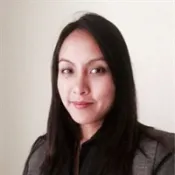

Discussion Members


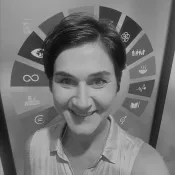


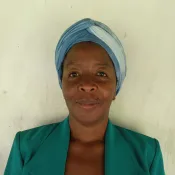

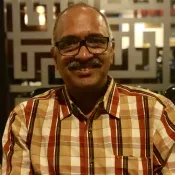

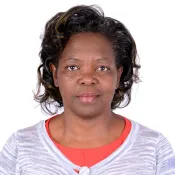







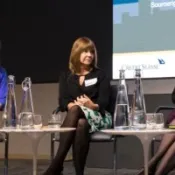
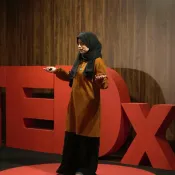
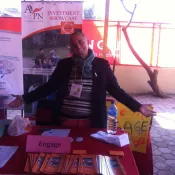
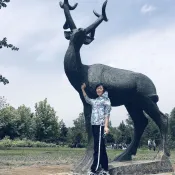



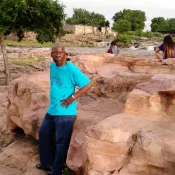

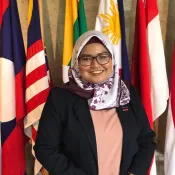
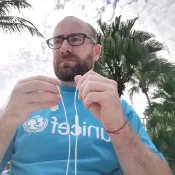

How to join
Share your ideas and experiences! To join the discussions, simply:
- Create a user account here
- Once your account has been activated, log in here (please make sure to check your spam).
- Then go this discussion forum
- Select the second tab, 'Discussion' to leave a comment and engage with other participants.
- For any technical issues, contact us here


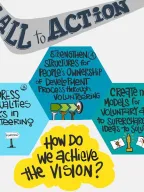
This virtual forum is the space for us to share, discuss and uncover approaches and ideas that are considered new or those that UNV is to explore more to position volunteering as a transformative power to accelerate progress towards the SDGs. As you know, we have 10 years to go, and everyone everywhere is to take action with urgency and does one’s part.
I am Boram from UNV Headquarters in Bonn, Germany and am very delighted to be moderating this consultation together with my superstar colleague, Katrina. We have about four weeks to engage in this space, so please join us in sharing out-of-the-box thinking and practical suggestions informed by your expertise and experiences across the globe. I am excited to learn from each and every one of you in the coming weeks.
And now it’s over to you - "What are the models and big ideas that can catalyze reimagined support for volunteers and approaches to volunteering in the context of accelerating progress to achieve the SDGs?"
To be able to contribute by leaving a comment, make sure you have created a user account (see the ‘How to join’ tab in case of any trouble).
Looking forward to hearing your ideas and suggestions – to shape the future of volunteering together.
Boram